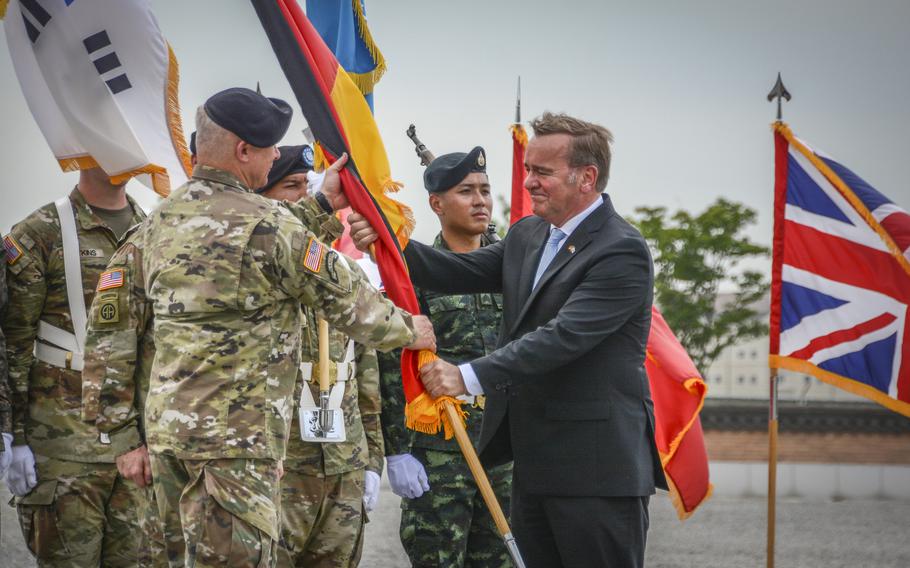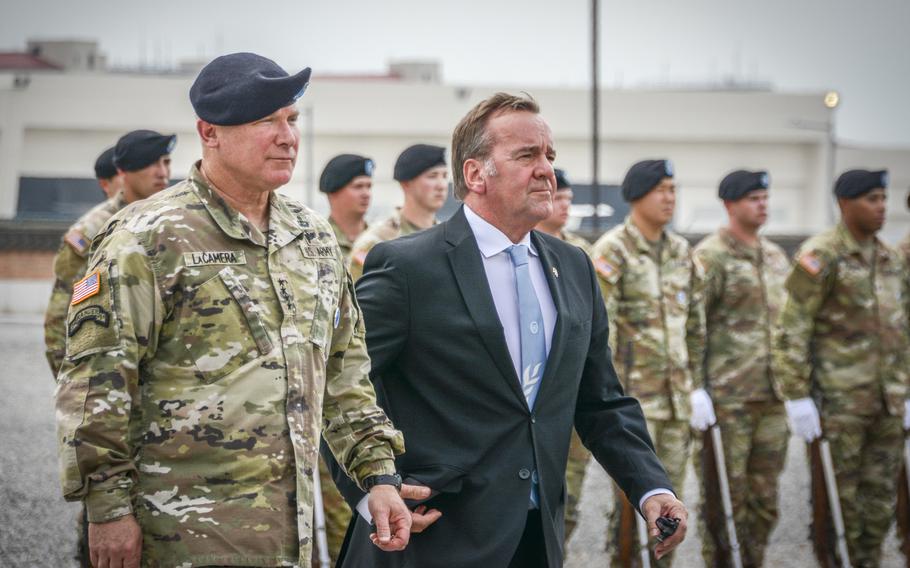
German Defense Minister Boris Pistorius passes his country's flag to Army Gen. Paul LaCamera, the head of U.N. Command and U.S. Forces Korea, during a ceremony at Camp Humphreys, South Korea, Friday, Aug. 2, 2024. (Luis Garcia/Stars and Stripes)
CAMP HUMPHREYS, South Korea — Germany on Friday joined United Nations Command, now 18 countries upholding the 71-year-old armistice agreement between North and South Korea.
Germany’s membership became official with a ceremony outside U.N. Command headquarters at Camp Humphreys. It was presided over by the head of the command, Army Gen. Paul LaCamera; German Defense Minister Boris Pistorius; and the chairman of South Korea’s Joint Chiefs of Staff, Adm. Kim Myung-soo.
In a speech to about 500 people, LaCamera, who also leads the U.S. Forces Korea, said Germany “was no exception” to the countries who assisted the command during and after the 1950-53 Korean War.
“The addition of Germany diversifies the perspectives and the resources available to the U.N. Command and enhances our collective expertise and capabilities,” LaCamera said.
Pistorius said Germany’s membership in the U.S.-led command underscored Berlin’s “dedication to peace and security in the Indo-Pacific region.”
“We need to show unity — we need to stand firm against those who want to undermine peace and stability,” he said. “By joining the U.N. Command, we showcase our dedication to share … our close ties with like-minded partners, particularly the U.S. and Korea.”
Speaking to reporters after the ceremony, Pistorius said talks are scheduled next month on Germany’s contribution in troops to the command.
Germany has joined the United States and South Korea in condemning North Korea’s behavior.

Army Gen. Paul LaCamera, the head of U.N. Command and U.S. Forces Korea, walks with German Defense Minister Boris Pistorius during a ceremony at Camp Humphreys, South Korea, Friday, Aug. 2, 2024. (Luis Garcia/Stars and Stripes)
After the North launched several short-range ballistic missiles on May 30, Germany’s Foreign Ministry released a statement accusing Pyongyang of violating U.N. Security Council resolutions and “endangering security both in the East Asia region and worldwide.”
The Korean War began on June 25, 1950, when North Korean forces invaded the South to unite the peninsula under communist rule. North Korean troops captured Seoul three days after the invasion, prompting the U.N. Security Council to establish the U.N. Command on July 7, 1950.
As the three-year war developed into a stalemate at the border dividing the peninsula, North Korea, China and the U.N. Command agreed to an armistice on July 27, 1953.
Twenty-two countries provided combat troops and medical aid to the command during the war.
West Germany — at the time half of another nation divided by communism — pledged to establish a field hospital in May 1953; however, the armistice was already signed by the time German aid arrived at Busan, South Korea’s largest port.
Those resources were used to build a hospital staffed by 117 German medical personnel, according to U.N. Command records. From 1954 to 1959, German doctors and nurses treated around 270,000 South Koreans and delivered roughly 6,000 babies.
Since the armistice signing, the command has enforced the agreement terms and provided security at the Demilitarized Zone between the two Koreas.
The other 17 member countries are Australia, Belgium, Canada, Colombia, Denmark, France, Greece, Italy, Netherlands, New Zealand, Norway, Philippines, South Africa, Thailand, Turkey, the United Kingdom and the United States.
Italy was the last country to join the command in 2013.